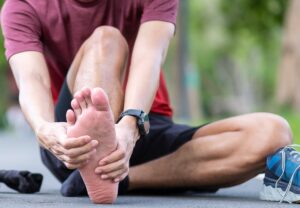Now that the weather is nice, people are getting out and engaging in exercise. However, due to the increase in intensity and frequency of exercise, the risk of injury also increases.
One injury that can result from the increase in exercise is a plantar fascia tear. This is characterised by an intense, localised pain along the arch of the foot or heels.
What is the Plantar Fascia?
The plantar fascia is a thick, web-like ligament that originates in heel, extends through the
arch and ends in forefoot. It is responsible for the stabilisation and support of the midfoot and
arch.
.
What is a plantar fascia tear?
A plantar fascia tear is commonly confused with plantar fasciitis due to its presentation of
morning pain and pain after standing and walking localised to the heel and arch. Plantar
fasciitis is however an inflammation of the planta fascia and generally easier to treat. Plantar
fasciitis however often precedes a tear. Other causes can include:
• High-impact exercises/sports
• Sudden increase in intensity or frequency
• Unsuitable footwear
• Weight gain or obesity
People with a hypermobile flat foot or an extremely high arched foot are more prone to this
injury as it causes more strain on the plantar fascia.
Signs/Symptoms:
• Hearing a popping sound underneath your foot
• Sharp and intense arch pain
• Swelling or bruising around the heel.
• A collapsed arch
• Pain when bending the big toe
What should you do if there is a tear?
If you suspect that your plantar fascia is torn and there is an intense pain with bruising and
swelling, then immediately ice and elevate your foot to reduce the pain. Avoid any weight-
bearing activities and contact your podiatrist to prevent further damage. Your podiatrist will
most likely use ultrasound imaging to diagnose the tear and offloading techniques to treat
the tear (such as, an immobilisation boot).
After the acute injury has healed, your podiatrist will address your underlying biomechanical
issue with footwear and orthotics to prevent recurrence.
By Simon Hrobelko, PODIATRIST

BOOK ONLINE HERE for a BIOMECHANICAL ASSESSMENT and we can determine if you have a tear in your Plantar Fascia.